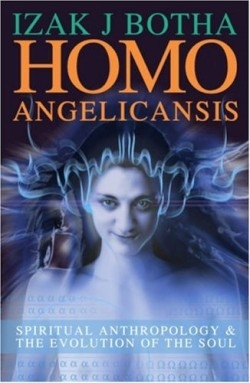Homo Angelicansis
Spiritual Anthropology & the Evolution of the Soul
…if there is such a thing as the soul then it is still steeped in mystery and supernature and has yet to be explained…
Straight out of Cape Town Izak Botha applies a wide-open mind to the task of pinning down the human soul’s origin. This isn’t religious posturing and it isn’t an obscure exercise. He wants to understand in order to apply that knowledge to the development of Homo Sapiens’ successor species the only hope for our souls’ long term survival. As the world reaches carrying capacity and resources disappear we’ll have to find a way to travel elsewhere without the encumbrance of bodies if possible.
Homo Angelicansis represents a categorical shift in evolution. As genetic science comes to direct an increasing amount of the physical aspects of human beings the natural impetus for change may stall out completely. At the same time our “spiritual intelligence” is trending toward rapid expansion. “…the soul is becoming conscious of its own existence…”
The history of Christianity is mined for answers but like Buddhism it is found unhelpful in producing anything concrete: “…religious doctrine holds no water since it is riddled with dogma which is sustained merely by faith.” Occultism and Theosophy are similarly flawed as is Descartes’ dualism. The principles of Cosmology may or may not prove useful. Susan Blackmore’s work on memetics may represent an advance. Near Death Experiences in which hospital patients experience thoughts or memories while flat-lined on brain activity offer a promising lead. Heavyweights of Reason such as Thomas Paine Albert Einstein and Stephen Hawking are tapped for a clue each.
The bibliography lists about three hundred books and articles*. Part One* presents a number of crackpot notions postulated by various erudite nutjobs. The proposed sources of the soul run the gamut from reptilian extraterrestrial invaders to the absurdly unreasonable: “…the possible crossbreeding between divinity and humans is something that has plagued researchers for some time.” The author isn’t quick enough at clarifying that he discounts the unadulterated insanity so those unwarned may give up before they reach the main body of tremendously insightful analysis. Though Botha considers unusual perspectives nothing is accepted without tangible proof the kind educated people buy into.
The leadoff pack of ideas is similar to something brown stuck to the bottom of a shoe but amazing improvement pulls Homo Angelicansis back from the fringe. Midway through it’s worth mentioning to a friend. Eventually Botha’s inquiry and line of logic seem beyond the merely plausible—it is urgently imperative. More questions are raised than answered but the broad casting yields real results and the loose ends point to future research.
Disclosure: This article is not an endorsement, but a review. The publisher of this book provided free copies of the book and paid a small fee to have their book reviewed by a professional reviewer. Foreword Reviews and Clarion Reviews make no guarantee that the publisher will receive a positive review. Foreword Magazine, Inc. is disclosing this in accordance with the Federal Trade Commission’s 16 CFR, Part 255.

